Computing/The Internet
 Books relating to Computing/The Internet
Books relating to Computing/The Internet
Mind As Machine
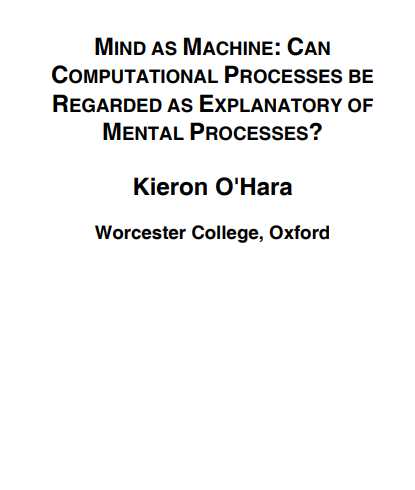
The aim of the thesis is to evaluate recent work in artificial intelligence (AI). It is argued that such evaluation can be philosophically interesting, and examples are given of areas of the philosophy of AI where insufficient concentration on the actual results of AI has led to missed opportunities for the two disciplines — philosophy and AI — to benefit from cross-fertilization. The particular topic of the thesis is the use of AI techniques in psychological explanation. The claim is that such techniques can be of value in psychology, and the strategy of proof is to exhibit an area where this is the case. The field of model-based knowledge-based system (KBS) development is outlined; a type of model called a conceptual model will be shown to be psychologically explanatory of the expertise that it models.
Web Science
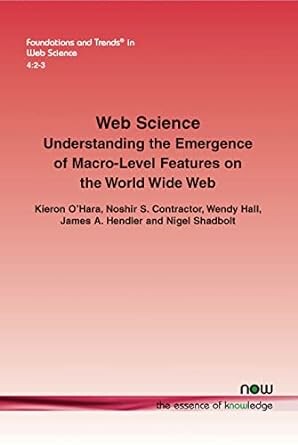
Understanding the Web is a problem on a par with other complex scientific challenges such as climate change or the human genome. The requirement for understanding should ideally be accompanied by some measure of control, which makes Web Science crucial in the future provision of tools for managing our interactions, our politics, our economics, our entertainment, and – not least – our knowledge and data sharing. The Web is a critical infrastructure that underpins increasingly many of our transactions, and yet is barely understood by policymakers. The theme of emergence is discussed as the characteristic phenomenon of web-scale applications, where many unrelated micro-level actions and decisions, uninformed by knowledge about the macro-level, still produce noticeable and coherent effects at the scale of the Web.
The Spy in the Coffee Machine

We are entering a new state of global hypersurveillance. As we increasingly resort to technology for our work and play, our electronic activity leaves behind digital footprints that can be used to track our movements. In our cars, telephones, even our coffee machines, tiny computers communicating wirelessly via the Internet can serve as miniature witnesses, forming powerful networks whose emergent behaviour can be very complex, intelligent, and invasive. The question is: how much of an infringement on privacy are they? Exposing the invasion of our privacy from CCTVs to blogs, The Spy in the Coffee Machine explores what—if anything—we can do to prevent it from disappearing forever in the digital age, and provides readers with a much needed wake-up call to the benefits and dangers of this new technology.
The Devil’s Long Tail
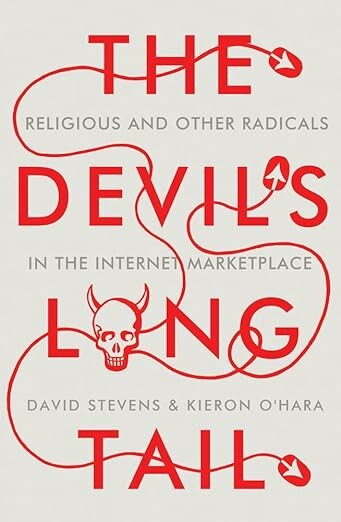
In The Devil’s Long Tail, Stevens and O’Hara argue that we misunderstand online extremism if we think intervention is the best way to counter it. Policies designed to disrupt radical networks fail because they ignore the factors that push people to the margins. Extremists are driven less by ideas than by the benefits of participating in a tightly-knit, self-defined, group. Rather, extreme ideas should be left to sink or swim in the internet’s marketplace of ideas.
inequality.com
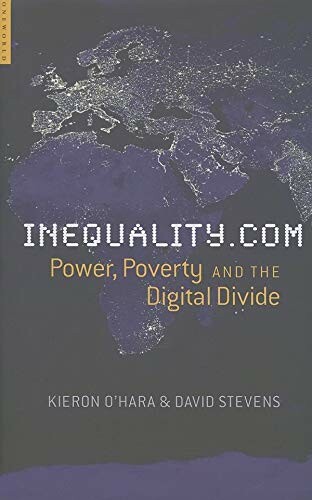
We can now shop, vote, congregate – some would even argue we can have sex – on an entirely new plane of existence: the Internet. While this new place provides illimitable opportunities, it also raises new concerns. In this revelatory new book, O’Hara and Stevens tackle the thorny issues which crop up in this unprecedented boundaryless, and often unregulated space. Arguing that the lack of Internet access can deprive the poor of services and information that are essential to their status as equal citizens in society, they also discuss uncertainty about future technologies undermines our personal liberty – we can never be sure how the web of information we leave around ourselves will be used in years to come. Bringing together the important social, political and philosophical issues surrounding the Internet, this book will grip the attention of anyone who wishes to understand the broader issues involved everytime they click on their web browser.
A Framework for Web Science
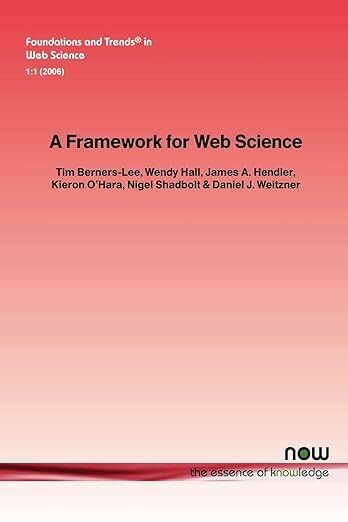
This text sets out a series of approaches to the analysis and synthesis of the World Wide Web, and other web-like information structures. A comprehensive set of research questions is outlined, together with a sub-disciplinary breakdown, emphasising the multi-faceted nature of the Web, and the multi-disciplinary nature of its study and development. These questions and approaches together set out an agenda for Web Science, the science of decentralised information systems. Web Science is required both as a way to understand the Web, and as a way to focus its development on key communicational and representational requirements. The text surveys central engineering issues, such as the development of the Semantic Web, Web services and P2P. Analytic approaches to discover the Web’s topology, or its graph-like structures, are examined. Finally, the Web as a technology is essentially socially embedded; therefore various issues and requirements for Web use and governance are also reviewed.
The Theory and Practice of Social Machines
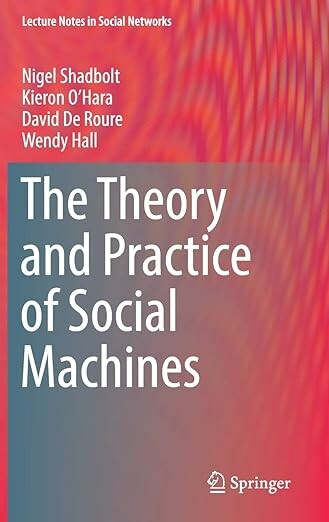
Social machines are a type of network connected by interactive digital devices made possible by the ubiquitous adoption of technologies such as the Internet, the smartphone, social media and the read/write World Wide Web, connecting people at scale to document situations, cooperate on tasks, exchange information, or even simply to play. Existing social processes may be scaled up, and new social processes enabled, to solve problems, augment reality, create new sources of value, and disrupt existing practice.
Digital Modernity

This monograph reviews narratives of digital modernity, which selectively discuss aspects of our sociotechnical context, descriptively, teleologically or normatively. Digital modernity narratives focus on the possibilities of the data gathered by an ambient data infrastructure, enabled by ubiquitous devices such as the smartphone, and activities such as social networking and e-commerce. Some emphasise continuities with 20th century modernity narratives, while others emphasise discontinuity, such as theories of the singularity. Digital modernity is characterised by: a subjunctive outlook where people’s choices can be anticipated and improved upon; the valorisation of disruptive innovation on demand; and control provided by data analysis within a virtual realm (cyberspace or the metaverse) which can be extended and applied to the physical world (in such applications as the quantified self and the smart city). The synergies and tensions between these three aspects are explored, as are the opportunities for and dilemmas posed by misinformation.
Four Internets
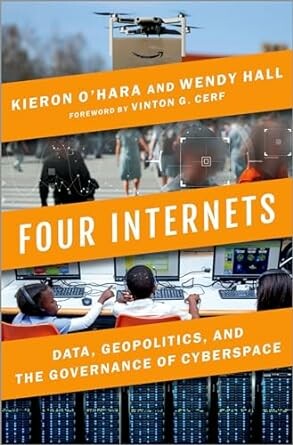
Four Internets offers a revelatory new approach for conceptualizing the Internet and understanding the sometimes rival values that drive its governance and stability. It contends that the apparently monolithic “Internet” is in fact maintained by four distinct value systems—the Silicon Valley Open Internet, the Brussels Bourgeois Internet, the DC Commercial Internet, and the Beijing Paternal Internet—competing to determine the future directions of internet affordances for freedom, innovation, security, and human rights.
 Articles relating to Computing/The Internet
Articles relating to Computing/The Internet
The Sense and Nonsense of AI Ethics: a Whistle Stop Tour
The Fearless Scholar
2026
Themes: Artificial Intelligence (AI)
Category: Blog
AI research has been energised since the unveiling of AlphaGo in 2016 and ChatGPT in 2022, demonstrating capabilities well beyond public and even expert expectations. It also has acquired a chaperone, a growing cottage industry of AI ethics to describe, diagnose, and ultimately remedy its perceived potential harms. There is no legal demand to be ethical, and no-one can force you to be ethical, so there is a limit to the number of harms it can prevent. The result is a crowded field with a confusion of non-problems, non-serious problems, non-specific problems and the real deal.
Read the articleFive AI management strategies—and how they could shape the future
Atlantic Council GeoTech Center AI Connect II
2025
Co-authors: Wendy Hall
Themes: Artificial Intelligence (AI)
Category: Blog, Open access
The AI governance regime is evolving, and fortunately it is focused on predictable or evident risks, not speculative existential threats. Governments can legislate, and some have. New institutions, such as the EU’s AI Office and Britain’s AI Safety Institute, have emerged. Supranational groupings foster cooperation and standards, such as the United Nations AI Advisory Body, or the Group of Seven’s Hiroshima Process, and alongside these has been a tsunami of summitry and experience sharing. The combination of government regulation, global policy frameworks, research and testing infrastructure, and best practices will gradually coalesce into a recognizable AI governance regime with established norms and shared principles. In this shuffle, we see the repurposing of the ideal types of governance of the O’Hara/Hall Four Internets framework as governance strategies in the AI context, which we term Artificial Intelligence Management Strategies, or AIMS.
Read the articleFive AIMS: Lessons from Internet Governance for Artificial Intelligence Management Strategies
Sciences Po Tech & Global Affairs Innovation Hub
2025
Co-authors: Wendy Hall, Pierre Noro
Themes: Artificial Intelligence (AI)
Category: Open access, White paper/report
To help scaffold coherent, coordinated, and enforceable rules and institutions, Dame Wendy Hall, Kieron O’Hara, and Pierre Noro reinterpret the Four Internet models elaborated by Hall and O’Hara in their influential book Four Internets: Data, Geopolitics, and the Governance of Cyberspace in regard to AI technologies. This translation, grounded in an analysis of the historical, socio-economic, and ideological differences distinguishing the context that shaped Internet governance and the current one, yields many enlightening insights and is the foundation of five Artificial Intelligence Management Strategies (AIMS). With many illustrations to exemplify their core tenets, their limits and their intersections, this paper offers the Five AIMS as cardinal concepts to help AI governance stakeholders, especially public and private decisionmakers, navigate the upcoming AI Action Summit and future governance conversation. Concluding on a set of ongoing research questions reflecting open policy challenges, it is a foundational step towards cementing the Five AIMS as a suitable framework for understanding the governance of AI.
Read the article Download the articleZuckerberg’s cave: smartness and discipline in digital modernity
Dariusz Brzezinsky, Kamil Filipek, Kuba Piwowar & Malgorzata Winiarska-Brodowska (eds.), Algorithms, Artificial Intelligence and Beyond: Theorizing Society and Culture of the 21st Century, 72-88
2024
Themes: Artificial Intelligence (AI), Digital modernity
Category: Book chapter, Peer reviewed
This chapter discusses some of the narratives or imaginaries that help structure our experience of, and the development of, the technological suite that mediates the affordances of social life in wealthy Western societies (and increasingly in less wealthy ones, and elsewhere than the West) in the 2020s. It argues that, far from society having transcended modernity to become postmodern, modernity has evolved, from the ‘high’ or ‘reflexive’ modernity of the late 20th century to a characteristic digital modernity. The chapter draws out some of its consequences, sketching its four institutional dimensions. Its disciplinary stance towards individuals gives rise to a myth which is termed Zuckerberg’s Cave, which is compared to the pre-modern cave of Plato, as well as analogous myths of modernity. The realistic prospects of digital modernity are assessed, setting out both its practical risks and its attractions to citizens and policymakers alike.
Read the articlePrivacy, privacy enhancing technologies and the individual
Web Science Trust White Paper #1
2022
Themes: Privacy, Semantic Web/linked data
Category: White paper/report
Law has granted individuals some rights over the use of data about them, but data protection rights have not redressed the balance between the individual and the tech giants. A number of approaches aim to augment personal rights to allow individuals to police their own information space, facilitating informational self-determination. This reports reviews this approach to privacy protection, explaining how controls have generally been conceived either as the use of technology to aid individuals in this policing task, or the creation of further legal instruments to augment their powers. It focuses on two recent attempts to secure or support data protection rights, one using technology and the other the law. The former is called Solid, a decentralised platform for linked data, while the latter is a novel application of trust law to develop data trusts in which individuals’ data is managed by a trustee with the individuals as beneficiaries. The report argues that structural impediments make it hard for thriving, diverse ecosystems of Solid apps or data trusts to achieve critical mass – a problem that has traditionally haunted this empowering approach.
Read the article Download the articlePersonalisation and digital modernity: deconstructing the myths of the subjunctive world
Utal Kohl & Jacob Eisler (eds.), Data-Driven Personalisation in Markets, Politics and Law, 37-54
2021
Themes: Computing/The Internet, Digital modernity
Category: Book chapter, Open access, Peer reviewed
In this chapter, I discuss the role of personalisation in a wider narrative of the development of democratic societies, in terms of digital modernity, driven by a vision of data-driven innovation over networked structures facilitating socio-environmental control. This chapter deals with narratives of how modernity plays out and is implemented by institutions and technologies, which are inevitably partial, and selective in what they foreground and ignore. It begins with a discussion of digital modernity, showing how data-driven personalisation is central to it, and how privacy not only loses its traditional role as a support for individuality, but becomes a blocker for the technologies that will realise the digitally modern vision. The chapter develops the concept of the subjunctive world, in which individuals’ choices are replaced by what they would have chosen if only they had sufficient data and insight. Furthermore, the notions of what is harmful for the individual, and the remedies that can be applied to these, become detached from the individual’s lived experience, and reconnected, in the policy space, to the behaviour and evolution of models of the individual and his or her environment.
Read the article Download the articleData trusts
European Data Protection Law Review, 6(4), 484-491
2020
Themes: Data trusts, Privacy
Category: Journal article, Open access
Recent years have seen the burgeoning of a literature on data trusts, and the unwary might therefore be led to believe that it is an idea whose time has come. Unfortunately, the ideas of the various authors who have contributed to this literature, who include the present author, haven’t always coincided, and have been aimed at different problems at different levels of detail and hand-waving. We might therefore say more accurately that ‘data trust’ is a brand whose time has come, which in itself is a not uninteresting phenomenon, worthy of consideration.
Read the article Download the articleExplainable AI and the philosophy and practice of explanation
Computer Law and Security Review, 39, 105474
2020
Themes: Artificial Intelligence (AI)
Category: Journal article, Peer reviewed
Considerations of the nature of explanation and the law are brought together to argue that computed accounts of AI systems’ outputs cannot function on their own as explanations of decisions informed by AI. The important context for this inquiry is set by Article 22(3) of GDPR. The paper looks at the question of what an explanation is from the point of view of the philosophy of science – i.e. it asks not what counts as explanatory in legal terms, or what an AI system might compute using provenance metadata, but rather what explanation as a social practice consists in, arguing that explanation is an illocutionary act, and that it should be considered as a process, not a text. It cannot therefore be computed, although computed accounts of AI systems are likely to be important inputs to the explanatory process.
Read the article Download the articleThe four visions shaping the way we use the Internet
Centre for International Governance Innovation
2019
Co-authors: Catherine Tsalikis, Wendy Hall
Themes: Computing/The Internet
Category: Interview
30 years on from the invention of the web, the ideas of openness, transparency and universal access that underpinned Tim Berners-Lee’s founding vision are under threat. What’s more, as the University of Southampton’s Wendy Hall and Kieron O’Hara explain, the traditional model of the open internet — a given in Silicon Valley — is being challenged by various alternatives, some of which are backed by major geopolitical players. With more than four billion internet users globally, questions about which version of the internet might prevail will only become more urgent in the coming months and years. In this written interview with CIGI, Hall and O’Hara jointly discuss how geopolitics play into the competing visions, what’s at stake as more and more people come online, and what internet governance might look like in the future.
Read the articleData trusts: ethics, architecture and governance for trustworthy data stewardship
Web Science Institute White Paper #1, University of Southampton
2019
Themes: Data trusts, Trust
Category: White paper/report
In their report on the development of the UK AI industry, Wendy Hall and Jérôme Pesenti recommend the establishment of data trusts, “proven and trusted frameworks and agreements” that will “ensure exchanges [of data] are secure and mutually beneficial” by promoting trust in the use of data for AI. This paper defends the following thesis: A data trust works within the law to provide ethical, architectural and governance support for trustworthy data processing. Data trusts are therefore both constraining and liberating. They constrain: they respect current law, so they cannot render currently illegal actions legal. They are intended to increase trust, and so they will typically act as further constraints on data processors, adding the constraints of trustworthiness to those of law. Yet they also liberate: if data processors are perceived as trustworthy, they will get improved access to data. The paper addresses the areas of: trust and trustworthiness; ethics; architecture; legal status.
Read the article Download the articleFour Internets: the geopolitics of digital governance
Centre for International Governance Innovation paper no.206
2018
Co-authors: Wendy Hall
Themes: Computing/The Internet
Category: White paper/report
The internet — a fragile construction of hardware, software, standards and databases — is run by an ever-expanding range of private and public actors constrained only by voluntary protocols and subject to political pressure. The authors describe four emerging views of how best to govern the internet, each playing a geopolitical role and championed at the national level.
The first, the Silicon Valley open internet, reflects the idealism of the internet’s creators, who engineered it to be open, with transparent standards and portable, extensible and interoperable data and software, and also to scale as it grew.
European nations, and the European Commission, champion a second model — a “bourgeois” internet, where trolling and bad behaviour are minimized and privacy protected, possibly at the cost of innovation.
China and many other nations see a third, authoritarian internet, where surveillance and identification technologies help ensure social cohesion and security.
The fourth and more commercial view, characteristic of the US Republicans in Washington, DC, understands online resources as private property, whose owners can monetize them and seek market rates for their use.
The competition to establish which, if any, of the four internets will prevail (however temporarily) is likely to be strong, and not always focused on win-wins. Further, the internet’s openness is a vulnerability that can be exploited for misinformation or hacking, an opportunity taken by Russia, Iran and North Korea, among others. The authors argue we need to be prepared for the internet that we know to evolve unpredictably, and work to ensure that it remains beneficial for humankind.
Read the article Download the articleWhy should I? Cybersecurity, the security of the state and the insecurity of the citizen
Politics and Governance, 6(2), 41-48
2018
Co-authors: Lizzie Coles-Kemp, Debi Ashenden
Themes: Cybersecurity, Society
Category: Journal article, Open access, Peer reviewed
Assumptions are made by government and technology providers about the power relationships that shape the use of technological security controls and the norms under which technology usage occurs. We present a case study carried out in the North East of England that examined how a community might work together using a digital information sharing platform to respond to the pressures of welfare policy change. We describe an inductive consideration of this highly local case study before reviewing it in the light of broader security theory. By taking this approach we problematise the tendency of the state to focus on the security of technology at the expense of the security of the citizen. From insights gained from the case study and the subsequent literature review, we conclude that there are three main absences not addressed by the current designs of cybersecurity architectures. These are absences of: consensus as to whose security is being addressed, evidence of equivalence between the mechanisms that control behaviour, and two-way legibility. We argue that by addressing these absences the foundations of trust and collaboration can be built which are necessary for effective cybersecurity. Our consideration of the case study within the context of sovereignty indicates that the design of the cybersecurity architecture and its concomitant service design has a significant bearing on the social contract between citizen and state. By taking this novel perspective new directions emerge for the understanding of the effectiveness of cybersecurity technologies.
Read the article Download the articlePity the poor engineer: review of Ragnedda & Muschert, Theorizing Digital Divides, and Ekbia & Nardi, Heteromation
European Journal of Communication, 33(3), 338-343
2018
Themes: Computing/The Internet, Digital modernity
Category: Book review, Open access
Review of two books, different in tone and intended audience, pour cold water on the optimism of the engineering project of using digital technologies to enable networks to develop and flourish at scale. Theorizing Digital Divides punctures the positive narrative of inclusion, while Heteromation problematises the whole idea.
Read the article Download the articleOn blockchains and the General Data Protection Regulation
EU Blockchain Observatory and Forum
2018
Co-authors: Luis-Daniel Ibáñez, Elena Simperl
Themes: Blockchain/cryptocurrency, Data protection
Category: Open access, Peer reviewed, White paper/report
In this paper, we review the legal and technological state of play of the GDPR-Blockchain relationship. Next, we analyse three interaction scenarios between data subjects and blockchain systems, and propose possible ways of achieving GDPR compliance by using state of the art technologies. Finally we review current efforts in the use of blockchains to enforce GDPR principles, in particular ‘Data Protection by Design’.
Read the article Download the articleThe contradictions of digital modernity
AI & Society, 35(1), 197-208
2018
Themes: Computing/The Internet, Digital modernity
Category: Journal article, Open access, Peer reviewed
This paper explores the concept of digital modernity, the extension of narratives of modernity with the special affordances of digital networked technology. Digital modernity produces a new narrative which can be taken in many ways: to be descriptive of reality; a teleological account of an inexorable process; or a normative account of an ideal sociotechnical state. However, it is understood that narratives of digital modernity help shape reality via commercial and political decision-makers, and examples are given from the politics and society of the United Kingdom. The paper argues that digital modernity has two dimensions, of progression through time and progression through space, and these two dimensions can be in contradiction. Contradictions can also be found between ideas of digital modernity and modernity itself, and also between digital modernity and some of the basic pre-modern concepts that underlie the whole technology industry. Therefore, digital modernity may not be a sustainable goal for technology development.
Read the article Download the articleAI in the UK: A Short History
Wendy Hall & Jérôme Pesenti, Growing the Artificial Intelligence Industry in the UK, 18-20
2017
Themes: Artificial Intelligence (AI)
Category: Book chapter, Open access
A brief narrative of the major events in British AI research from Alan Turing to DeepMind.
Read the article Download the articleSmart contracts – dumb idea
IEEE Internet Computing, 21(2), 97-101
2017
Themes: Blockchain/cryptocurrency
Category: Journal article, Open access, The Digital Citizen
Increasingly in e-commerce, smart contracts have relied on the code as the contract. But code can be hacked and fail, leaving multiple parties potentially exposed to legal gray areas, great financial loss, and little recourse. Here, Kieron O’Hara considers the ramifications of such contracts by exploring what happened when the Ethereum platform was hacked in the summer of 2016.
Read the article Download the articleAuthority printed upon emptiness
IEEE Internet Computing, 19(6), 72-76
2015
Themes: Blockchain/cryptocurrency
Category: Journal article, Open access, The Digital Citizen
In a time of economic volatility, what can cryptocurrencies such as bitcoin bring to the table? What new vulnerabilities would they introduce? And could they be minimized through consumer protection mechanisms?
Read the article Download the articleThe fridge’s brain sure ain’t the icebox
IEEE Internet Computing, 18(6), 81-84
2014
Themes: Computing/The Internet, Privacy
Category: Journal article, Open access, The Digital Citizen
The emergence of the Internet of Things (IoT) promises new and exciting possibilities for our personal health, transport, the environment, and many other areas. However, it does of course pose privacy and security problems. This article argues that there are six complex and difficult privacy concerns that are specific to the IoT. The situation is made even more complex because it isn’t clear who should regulate the IoT, and how best to do it.
Read the article Download the articleThe future of social Is personal: the potential of the Personal Data Store
Daniele Miorandi, Vincenzo Maltese, Michael Rovatsos, Anton Nijholt & James Stewart (ed.), Social Collective Intelligence: Combining the Powers of Humans and Machines to Build a Smarter Society, 125-158
2014
Co-authors: Max Van Kleek
Themes: Computing/The Internet, Privacy
Category: Book chapter, Peer reviewed
This chapter argues that technical architectures that facilitate the longitudinal, decentralised and individual-centric personal collection and curation of data will be an important, but partial, response to the pressing problem of the autonomy of the data subject, and the asymmetry of power between the subject and large scale service providers/data consumers. Towards framing the scope and role of such Personal Data Stores (PDSs), the legalistic notion of personal data is examined, and it is argued that a more inclusive, intuitive notion expresses more accurately what individuals require in order to preserve their autonomy in a data-driven world of large aggregators. Six challenges towards realising the PDS vision are set out: the requirement to store data for long periods; the difficulties of managing data for individuals; the need to reconsider the regulatory basis for third-party access to data; the need to comply with international data handling standards; the need to integrate privacy-enhancing technologies; and the need to future-proof data gathering against the evolution of social norms. The open experimental PDS platform INDX is introduced and described, as a means of beginning to address at least some of these six challenges.
Read the articleLinked data in government
IEEE Internet Computing, 17(4), 72-77
2013
Co-authors: Nigel Shadbolt
Themes: Semantic Web/linked data, Transparency/open data
Category: Journal article, Peer reviewed
Government data is powerful, plentiful, and relevant to citizens’ concerns. Making it open supports transparency, crowdsourcing data enhancement, and innovative service development. The authors review the state of linked open government data, in the context of the potential for the publishing organizations and the Linked Data Web itself, as well as the administrative and political issues raised.
Download the articleThe read-write Linked Data Web
Philosophical Transactions of the Royal Society A: Mathematical, Physical and Engineering Sciences, 371(1987), 20120513
2013
Co-authors: Tim Berners-Lee
Themes: Semantic Web/linked data
Category: Journal article, Open access
This paper discusses issues that will affect the future development of the Web, either increasing its power and utility, or alternatively suppressing its development. It argues for the importance of the continued development of the Linked Data Web, and describes the use of linked open data as an important component of that. Second, the paper defends the Web as a read–write medium, and goes on to consider how the read–write Linked Data Web could be achieved.
Read the article Download the articleWelcome to (and from) the Digital Citizen
IEEE Internet Computing, 17(1), 92-95
2013
Themes: Computing/The Internet, Politics
Category: Journal article, Open access, The Digital Citizen
In this introductory Digital Citizen column, Kieron O’Hara explores some issues regarding the definition of “digital citizenship,” focusing on the associated rights and responsibilities, the value to be gained from citizenship, and the problems caused by conflict.
Read the articleLinked open government data: lessons from data.gov.uk
IEEE Intelligent Systems, 27(3), 16-24
2012
Co-authors: Nigel Shadbolt, Tim Berners-Lee, Nicholas Gibbins, Hugh Glaser, Wendy Hall, mc schraefel
Themes: Semantic Web/linked data, Society, Transparency/open data
Category: Journal article, Peer reviewed
A project to extract value from open government data contributes to the population of the linked data Web with high-value data of good provenance.
Read the articleSemantic Web
Robert A. Meyers (ed.), Computational Complexity: Theory, Techniques, and Applications, New York: Springer, 2810-2829
2011
Co-authors: Wendy Hall
Themes: Semantic Web/linked data
Category: Book chapter, Peer reviewed
Encyclopaedia article about the Semantic Web, containing a Glossary and a Definition of the Subject, together with discussions of: Linking Data; The Layered Model of the Semantic Web; Applications; Controversies; and Future Directions.
Read the articleAvoiding omnidoxasticity in logics of belief: a reply to MacPherson
Notre Dame Journal of Formal Logic, 36(3), 475-495
1995
Co-authors: Han Reichgelt, Nigel Shadbolt
Themes: Artificial Intelligence (AI)
Category: Journal article, Open access, Peer reviewed
In recent work MacPherson argues that the standard method of modeling belief logically, as a necessity operator in a modal logic, is doomed to fail. The problem with normal modal logics as logics of belief is that they treat believers as “ideal” in unrealistic ways (i.e., as omnidoxastic); however, similar problems re-emerge for candidate non-normal logics. The authors argue that logics used to model belief in artificial intelligence (AI) are also flawed in this way. But for AI systems, omnidoxasticity is impossible because of their finite nature, and this fact can be exploited to produce operational models of fallible belief. The relevance of this point to various philosophical views about belief is discussed.
Read the article Download the article Talks relating to Computing/The Internet
Talks relating to Computing/The Internet
Old Man Shouts at Cloud – Could Trump turn off Europe’s Internet?
The Bunker podcast
August 13th, 2025
Themes: Computing/The Internet, Politics
Listen5 AIMS: Ideology and Divergent Interpretations of Trustworthy AI
SPRITE+ Lunch and Learn talk
March 19th, 2025
Themes: Artificial Intelligence (AI), Digital modernity, Politics, Trust
Category: Invited talk
WatchInsta-Worthy Memories and Filtered Truth
Royal Institute of Philosophy London Lecture Series 2024-25: Remembering and Forgetting
January 23rd, 2025
Themes: Computing/The Internet, Digital modernity, Memory
Category: Invited talk
WatchIs the Internet Splintering?
The Gem of all Mechanisms (British Computer Society podcast)
October 13th, 2022
Themes: Computing/The Internet
ListenData Mining – Exploring the Ethical Dilemmas
#MiningData, Exploring the Ethical Dilemmas, Southampton
July 17th, 2018
Themes: Computing/The Internet, Privacy
Category: Panel
WatchFour Internets: Geopolitics, Ideology, and the Internet
Western Washington University
October 19th, 2022
Themes: Computing/The Internet
Category: Lecture/seminar
WatchWhat are Social Machines?
8th ESRC Research Methods Festival, Bath
July 4th, 2018
Themes: Computing/The Internet, Society
Category: Invited talk
WatchEthics of Surveillance, Power and Citizenship
#MiningData, Exploring the Ethical Dilemmas, Southampton
July 17th, 2018
Themes: Computing/The Internet, Privacy
Category: Invited talk
WatchTransparency, Open Data and Trust in Government
Web Science Conference
June 23rd, 2012
Themes: Computing/The Internet, Politics, Trust
Category: Conference talk
Watch Kieron O'Hara
Kieron O'Hara